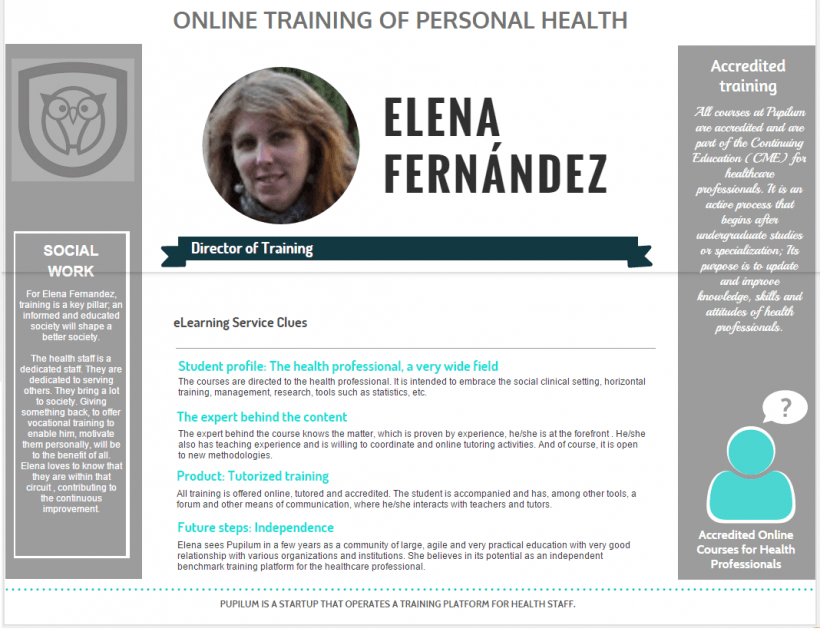eLearning For Health Professionals In The Spanish Market
Elena Fernandez has more than 25 years of experience in training for health professionals. Since 2013, she manages the training area of Pupilum, a startup that operates a platform for eLearning for health professionals. Initially, the company focused on doctors, but later on it opened to the rest of the health professions (which now are up to 30).
Social Work
For Elena Fernandez, training is a key pillar; a well-informed and well-educated society will be a better society. Specifically, the training of health professionals affects us all: A well-trained and updated professional should keep abreast of the research results and developments in the social health field; only then will make a greater patient care quality. Therefore, it is a very important social work that encourages a return to society.
The health staff is a dedicated staff. It is dedicated to serving others; it brings a lot to society. In order to give something back, to offer it a vocational training to enable it, to motivate it personally, will be to the benefit of all. Elena loves to know that they are within that circuit, contributing to the need for such continuous improvement.
Seal Of Quality
All courses taught on Pupilum campus are accredited and are part of Continuing Training (FMC) for health professionals. It is an active process that begins after undergraduate studies or specialization; its purpose is to update and improve knowledge, skills, and attitudes of health professionals. This is due to keep abreast of constant technological and scientific developments, to respond to social needs and to health system.
This process is regulated in Spain by the Law on Regulation of Health Professions. Although the law was published in 2003, a system of evaluating the quality of continuing education was established in 1997. This system is what is meant by Accreditation of Continuing Education Activities:
It is a procedure that is used to declare the quality of a continuing education course officially and nationally, in areas such as program content, methodology, objectives and teachers. Courses must meet minimum quality standards to be accredited. The assessment is based on 2 types of elements:
- Quantitative: Duration of activity.
- Qualitative: Goals, methodology, relevance, organization, evaluation and experience / knowledge of teachers.
After passing the assessment, each course is granted with credits. These credits tell the students that the course has gone through the accreditation system and what its level of quality is.
All Pupilum courses are accredited by the Commission on Continuing Education of Health Professionals of the Community of Madrid- National Health System.
Student Profile: The Health Professional, A Wide Field
The courses are directed to the health professional. It is intended to embrace the social clinical setting, horizontal training, management, research, tools such as statistics, etc.
Elena knows that health professionals are at a difficult time, in a precarious position and with a low motivation.
Training is a motivator. The clinician can attend Continuing Education Plans from the agency where he/she works. The problem is that these plans have been drastically reduced and are focused on very specific objectives of the institution. This can mean several things:
- First, the practitioner may not find the field where he/she wants to be trained to keep updated with his/her work.
- Second, he/she cannot find what helps him/her making progress in his/her careers.
- Finally, he/she cannot find something that allows him/her to develop personally. From institutions, it is claimed to the working professional to attest a continuous recycling. For example, in the emergency service, depending on the management body (in Madrid is the Samur and Summa 112), health workers are required every so often to give proof of upgrade. However, continuing education is not always eased to in order to demonstrate that recycling. When a health worker is unemployed, he/she becomes the first interested in always being updated, since otherwise he/she could not get qualified for the job.
Other factors should also be added:
- Time and distance.
The clinician does not have time to attend classroom courses, which also take place outside of their professional environment. - Cost.
When they can assist, this involves a number of costs, both for the professional himself and the institution where he/she works, since it would have to cover his/her absence.
Elena believes that here is where there is a gap in the market for companies that provide ongoing online quality training, as Pupilum.
Client's Profile
The final customer is the healthcare professional. Is the one that is accessing individually to continuing education courses. In addition, we are establishing institutional arrangements (scientific societies, professional associations, etc.), in which training is offered to professional groups. On the other hand, they have reached agreements with prestigious publishers to create treaty-based courses published by them.
Detection Of Needs
Pupilum is born after developing an online community of doctors, called Neomed. Hence the need for doctors to receive continuous training is detected.
Now, it is necessary to define which needs, at what level, what professions demand more, which specialties, what training (vertical or horizontal), etc.
To sharpen these needs, it is essential to analyze the social demands, the health system demands, keep abreast of what the scientific societies reveal, professional schools, etc. They get connected to experts to receive advice from them on the screening that has been done. After collecting all the information, they propose the creation of the course and they search for well trained teachers, both academically and professionally, to teach an online course.
In some areas of knowledge, there is not a well-defined offer in the health sector or professionals are requested to have a reinforcement and renovation. This is especially happening on the horizontal training, affecting all health professions and where we can find tools such as statistics, documentation, coaching, management, etc.
In relation to the vertical training, each health profession has its demands and all should be given a solution. The training required by a clinical psychologist is not the same, for example, than the training needed by a technician in emergencies. However, multidisciplinary groups do exist, as in the health centers, where training can be complemented. An example might be training in care for patients suffering from Alzheimer's or Parkinson's.
The Expert Behind The Content
After detecting the needs and hiring all teachers, they produce the content, based on objectives and pursuing a relevance. It is necessary to establish what knowledge the student will get when reaching the end, what will be changed: Will he/she expand knowledge? Will he/she acquire a skill, a training? Are he/she going to bring about a change in attitude?
There are courses in health care that cannot be completely eLearning: They need to be blended. A CPR course cannot be 100% online; theory itself may be covered with eLearning, while practice must be in person. Elena is aware of this situation and she understands that, in the future, these activities will open to a mixed type.
The expert behind the course knows the matter, and this is proven by his/her experience, he/she is at the forefront. He/she also has teaching experience and is willing to coordinate online tutoring activities. And of course, he/she is open to new methodologies. When the Continuing Education Committee evaluates a course, they consider the Curriculum Vitae of teachers (publications, participation in research projects, teaching given and received, etc.) as well as the attention that each teacher will provide to students.
The Online Tutor
The tutor must be a person who is qualified to online training. Not all teachers are prepared for that. You may find a teacher who is great in classes, but when it comes to e-learning, he/she encounters great difficulties:
- On the one hand, it is difficult to gather all the knowledge in writing, by having to synthesize and organize.
- On the other hand, the tutor must have digital skills that allow him/her to manage activities with students.
- In addition, he/she must have good communication, and be sociable and empathetic. It is necessary to side with the student, to understand what might be the situations for which he/she crosses. If in the activity of a classroom teacher it is important to communicate properly, in an online teaching, this ability is enhanced.
The teacher has to learn to interact with the student, he/she must be motivating, maintaining the momentum; not all health teachers do. It is important to see how he/she moves, how he/she operates with new technologies. Teachers have to combine a bit of everything, it is a quite complex work, but very satisfying.
Product: Continuing Tutorized Education
All training is offered online, tutored and accredited. The student is accompanied and has, among other tools, the forum and other means of communication, where he/she interacts with teachers and tutors. Among the courses, there are:
- Those whose methodology allows students to have a certain independence when scheduling their time.
- In addition, there are courses which learning systems are based on enriching debates, allowing students to reflect. This is the case with courses like "Palliative Care" or "Interpersonal Risks" in health work.
A community of students has been created, with which relationship keeps on. One feature of this community is that students repeat and perform another course, recommending the campus to others. Within the health professions, to decide what further training to perform, it is most influential the recommendation of a partner than from any other action groups or organizations.
Currently, the courses are in Spanish, but there are some courses in which some of the practices have to be done using Anglo-Saxon expressions or words. Spaniards students have been moved to other countries such as Germany, England, and France and there is a strong group of Latin American students. Currently there are students from 28 countries.
Elena realizes that the exchange of knowledge among students with this diversity would be very important, but by now it is an activity that is emerging.
Synergies With Other Institutions
By now, they do not collaborate with universities, but they would love to do another part of the training for health professionals, such as the postgraduate. This is another area in which health professionals demand training, which is also regulated and supported by the university.
Elena tells us that they are maintaining good relationships with professional bodies and associations. She believes in synergy and knows that her company can work together to bring them the training that is currently unavailable.
Next Steps
Elena says that they are continually improving, always open to new technologies, new methodologies that allow them to give the best possible experience for their students.
She sees Pupilum in a few years as a large, agile and very practical education community, with very good relationship with various organizations and institutions. She believes in its potential as a concerning and independent training platform for the healthcare professional.
Innovation On Campus
They have started a process in which they have already moved traditional training to eLearning; what they want to do this year is to move to the campus all the innovations and new technologies that are emerging. Their target audience is a group with a base of very traditional training, but also very diverse. There are groups that require video as a learning media; others claim the document; others, the role-playing.
The intention is to offer the maximum rate of educational resources to students, with a methodology that fits their objectives:
- On the one hand, the goal is that the student gets to be the one who will choose which training is best, what is the course that best suits his/her needs.
- On the other hand, you have to adapt to what you want to convey, because it is very complicated, for example that a student get to internalize how to communicate in difficult situations with a simple text behind.
In innovation related to eLearning for health professionals, there is much to do. They are open and what they are doing is to see if that is what the medical staff really demand and what specific occupations are requiring it. Often direction is lost, because it is believed that the eLearning, by applying the latest methodologies, is always the best. You have to combine well all aspects of training, including experience and the emotional factor. In the end, what remains, in addition to knowledge, training or acquired skills, is the experience and student satisfaction. We must not lose sight.
Publications
This is another aspect that is being valued. There are many blogs and information on the net about eLearning, but specifically related to health there is very little. They have a lot of information that could work to create scientific publications. By now, they have a small group of people and have not been released to do it, but they want to cover everything. They have to follow steps to go to fulfill objectives.
Do You Speak English?
They would like to also work in English. There are several communities of continued training which language is English. In Latin America there is a very powerful community that is demanding their training. In fact, they have done nothing of marketing and they encounter many students who have received them well. First they want to meet the needs of this community and then make the leap into English, without discarding to seize the opportunity, if it arises.
Training For Medical Devices Sales Staff
Elena does not know if they will do this, since this is not their focus. These would not be accredited courses, because the commercial, the visitor, what really needs is the product training. It is an aspect which so far has not been raised.
Concurrence
It is complicated because there are many centers that have taken advantage of the ignorance and created distance learning, not eLearning. Rather than sending the folder home, they upload it to a platform; they work with precarious methodologies, not relevant assessments and without tutoring. She believes that this has generated a smear of eLearning in the field of health, creating the idea that "anything goes".
In training sponsored by professional associations, scientific associations and other institutions, the situation is changing, offering quality training.
In the end, what matters is the quality of the product, its methodology, its contents, the attention of the tutor, the management of the secretary to the student. In short, that the student's experience is good and that the courses have a high number of credits. These two aspects will move the student to decide on a course or another.







